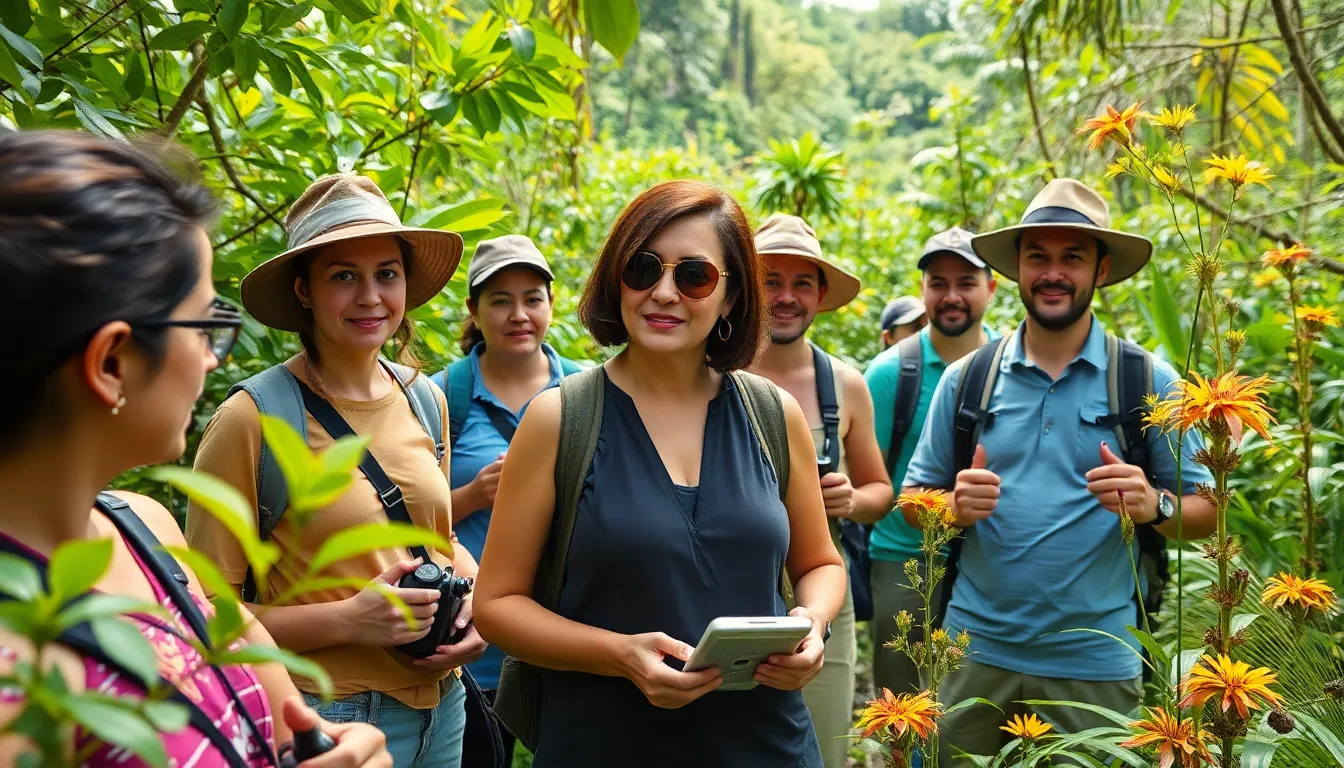Table of Contents
ToggleIn a world increasingly aware of environmental issues, ecotourism has emerged as a vital way to explore nature while promoting sustainability. Travelers today seek experiences that not only satisfy their wanderlust but also contribute positively to the ecosystems they visit. Ecotourism offers a unique blend of adventure and responsibility, allowing individuals to immerse themselves in breathtaking landscapes while supporting local communities.
From wildlife conservation projects to eco-friendly lodges, the possibilities for ecotourism are endless. This article dives into innovative ecotourism ideas that inspire responsible travel. Whether it’s hiking through pristine forests or participating in marine conservation efforts, these experiences not only enrich the traveler’s journey but also foster a deeper connection with the planet. Embracing these ideas can transform vacations into impactful adventures, making every trip a step toward a more sustainable future.
Overview of Ecotourism
Ecotourism focuses on responsible travel to natural areas, benefiting the environment and local communities. This approach prioritizes conservation, education, and appreciation of local cultures while minimizing ecological impact. Travelers engage in activities that promote sustainability and conserve ecosystems.
Ecotourism typically includes:
- Wildlife Conservation Programs: Travelers contribute to efforts that protect endangered species and restore natural habitats.
- Sustainable Lodging: Accommodations designed with eco-friendly practices minimize resource consumption and waste.
- Community Involvement: Tourists support local economies through responsible spending, ensuring benefits remain within the community.
- Education and Awareness: Guided tours and workshops provide insights into local ecosystems and cultural heritage, fostering environmental stewardship.
Travelers increasingly seek ecotourism experiences that align with their values of sustainability and social responsibility, creating a shift toward healthier ecosystems and empowered communities.
Key Principles of Ecotourism

Ecotourism is guided by key principles that ensure travel experiences benefit the environment and communities. These principles focus on sustainability and conservation, vital for responsible exploration of natural areas.
Sustainability
Sustainability emphasizes long-term ecological balance through eco-friendly practices. Sustainable tourism maintains natural resources by promoting responsible behaviors such as waste reduction and energy conservation. Travelers engage in activities that support local economies while minimizing negative environmental impacts. Examples include using renewable energy sources in accommodations and selecting tour operators committed to sustainable practices.
Conservation
Conservation prioritizes the protection of ecosystems and biodiversity. Ecotourism encourages participation in conservation efforts, such as wildlife monitoring and habitat restoration projects. Tourists often contribute funding or volunteer hours to local conservation initiatives. By engaging participants in hands-on experiences, ecotourism fosters deeper connections with nature and raises awareness about environmental issues. This active participation promotes a culture of stewardship that benefits both the environment and local communities.
Unique Ecotourism Ideas
Innovative ecotourism ideas provide unique travel experiences while promoting environmental sustainability and community engagement. These concepts enhance visitors’ understanding of local ecosystems and cultures.
Wildlife Safaris
Wildlife safaris focus on responsible wildlife observation, allowing travelers to connect with animals in their natural habitats. Guided tours educate participants on animal behavior and conservation efforts, making the experience meaningful and informative. Tour operators often contribute to local conservation initiatives or support anti-poaching efforts that protect endangered species. For example, in East Africa, several safari companies allocate a percentage of their profits to local wildlife conservation programs.
Community-Based Tourism
Community-based tourism connects travelers with local communities, providing authentic cultural experiences. Visitors engage in traditional crafts, cooking classes, or farming activities, fostering respect for local cultures. This approach empowers communities by promoting economic self-sufficiency and cultural preservation. For instance, programs in rural communities in Peru allow tourists to participate in sustainable agriculture, directly benefiting local families and preserving indigenous traditions.
Eco-Lodges and Green Hotels
Eco-lodges and green hotels prioritize sustainability and minimize their ecological footprints. These accommodations utilize renewable energy sources, implement water conservation measures, and procure locally sourced, organic food. They often offer educational programs that inform guests about local ecosystems and conservation practices. Properties such as those found in Costa Rica exemplify this trend by incorporating natural building materials and eco-friendly designs, enhancing guests’ connection to the surrounding environment.
Benefits of Ecotourism
Ecotourism presents numerous advantages that extend beyond travel enjoyment. It contributes positively to the environment, local economies, and cultural heritage.
Environmental Impact
Ecotourism reduces ecological footprints by promoting responsible travel practices. Travelers engage in activities that prioritize conservation, like reforestation projects and wildlife protection initiatives. Local flora and fauna receive crucial support, leading to improved biodiversity and ecosystem health. Sustainable practices, such as waste management and resource conservation, help preserve natural landscapes for future generations.
Economic Advantages
Ecotourism stimulates local economies by generating income through sustainable ventures. Tourists spend money on eco-friendly accommodations, guided tours, and local crafts. This infusion of capital leads to job creation in communities, enhancing livelihoods. By investing in conservation and responsible tourism, communities experience long-term economic stability while cultivating a sustainable tourism model that benefits both visitors and residents.
Cultural Preservation
Ecotourism fosters cultural preservation by promoting appreciation for local traditions. Travelers participate in cultural experiences that educate them about indigenous practices and historical significance. This engagement helps maintain cultural heritage while empowering local communities. Moreover, increased awareness fosters a sense of pride among residents, encouraging the continuation of traditional arts, crafts, and customs, which might otherwise face decline.
Challenges in Ecotourism
Ecotourism faces several challenges that can hinder its effectiveness and sustainability. Over-tourism and climate change represent two significant barriers to achieving the goals of responsible travel.
Over-Tourism
Over-tourism occurs when a destination receives more visitors than it can sustainably accommodate. This influx strains local resources, disrupts ecosystems, and degrades cultural heritage. Popular ecotourism sites often experience overcrowding, which diminishes visitor experiences and leads to environmental degradation, including soil erosion and habitat destruction. Implementing measures like visitor caps, reservation systems, and promoting lesser-known destinations can mitigate these effects. Responsible management strategies are essential for maintaining the integrity of ecosystems and local cultures.
Climate Change
Climate change significantly impacts ecotourism by altering ecosystems and diminishing biodiversity. Rising temperatures, changing precipitation patterns, and increased frequency of extreme weather events threaten wildlife habitats and disrupt natural cycles. Many ecotourism activities depend on stable ecosystems; thus, climate-related changes can affect wildlife sightings and alter landscape features. Travelers and operators must adopt adaptive practices, such as prioritizing conservation projects and promoting sustainable travel methods, to address these challenges effectively. Continuous education and awareness initiatives can also help engage visitors in climate action efforts.
Ecotourism offers a unique opportunity for travelers to explore the beauty of nature while making a positive impact on the environment and local communities. By choosing responsible travel options and engaging in sustainable practices, individuals can contribute to conservation efforts and support local economies. The innovative ideas presented in ecotourism not only enhance the travel experience but also foster a deeper connection to the planet. As awareness of environmental issues continues to grow, the shift towards ecotourism is more important than ever. Embracing these principles ensures that future generations can enjoy the wonders of nature while preserving them for years to come.





